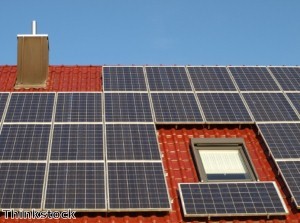|
The Clean Energy Finance Corporation has committed a $100 million financing facility to Origin Energy to help the utility giant expand its offerings of rooftop solar and battery storage to consumers. The 12-year financing facility will initially be used to boost Origin Energy’s recently launched solar offering, where it owns the rooftop solar array and sells the electricity generated to the home owner at a deep discount to normal grid prices. This is known as a power purchase agreement. Origin Energy is currently offering PPAs with prices as low as 11c/kWh to some consumers, nearly one-third of the price of grid electricity. The attraction for Origin is that it boosts its position in the solar market and locks in the consumer for the length of the PPA, which can be seven, 11 or 15 years. Origin Energy and the CEFC said the financing could also be used to support battery storage solutions. Origin is yet to offer battery storage in its PPA contracts, but it is currently trialling a battery solution in market and expects to roll out a product later this year. “Solar as a Service is already proving an attractive proposition to customers since it was launched earlier this year, and the CEFC finance will be used in expanding the offering, so more Australians can enjoy the benefits of solar,” Origin’s head of Solar and Emerging Businesses, Phil Mackey said. The Solar as a Service offering was launched in May and is currently available to residential and business consumers within a 100km radius of the central business districts of Adelaide, Brisbane, Gold Coast, Sydney and within a 50km radius of Townsville. The commitment to Origin Energy is by far the biggest so far offered by the CEFC. It has previously committed $70 million to US solar giant SunEdison, $20 million to ET Solar, and another $20 million to Australian solar manufacturer Tindo Solar. CEFC CEO Oliver Yates said PPAs offer a clear benefit for residential and business consumers, who can have increased confidence about their long-term electricity costs, while at the same time enjoying the benefits of solar.” The fact that the loan offering is on a 12-year term also means it can fit in with the maturity of the PPAs. These sort of terms are difficult to get from banks. The solar industry will also likely need to tap into CEFC funds to get finance on similar terms for large scale solar plants, particularly given the federal government’s push for more large scale solar.
Yates said the CEFC is considering more than $500 million in finance for solar projects, totalling more than $1 billion in value. “We are working with project proponents, major utilities and retailers to expand the range of solar finance options, to deepen solar penetration, diversify the technology deployment and lower costs,” Yates said in a statement. We hope to be in a position to announce further solar projects in the near future.” SunEdison announced via The Age on Wednesday that it would offer PPAs at 14.6c/kWh to its customers – which it described as half the price of grid costs. This brought a curious response from the Energy Networks Association, the lobby group for network operators, which said that customers with solar leasing still needed the grid. Therefore, ENA chief John Bradley said, the costs of the PPA were only comparable with wholesale and retail charges, which would be lower than 14c/kWh in most states. Bradley seemed to be suggesting that grid charges will remain, even if fixed to ensure the networks got their return on assets. And in case anyone was thinking of disconnecting, the ENA repeated its warning that disconnecting would cost customers “5 to 8 times” more to try to replicate a grid service with a stand alone power system. That number would be subject to considerable debate from those who have already achieved it. “Significant subsidies have driven world’s highest penetration rates of rooftop solar but they have also unintentionally exacerbated cross subsidies under outdated electricity tariffs, pushing up costs for other customers,” Bradley said in a statement This article is sourced from Renew Economy
1 Comment
|
|


 RSS Feed
RSS Feed


